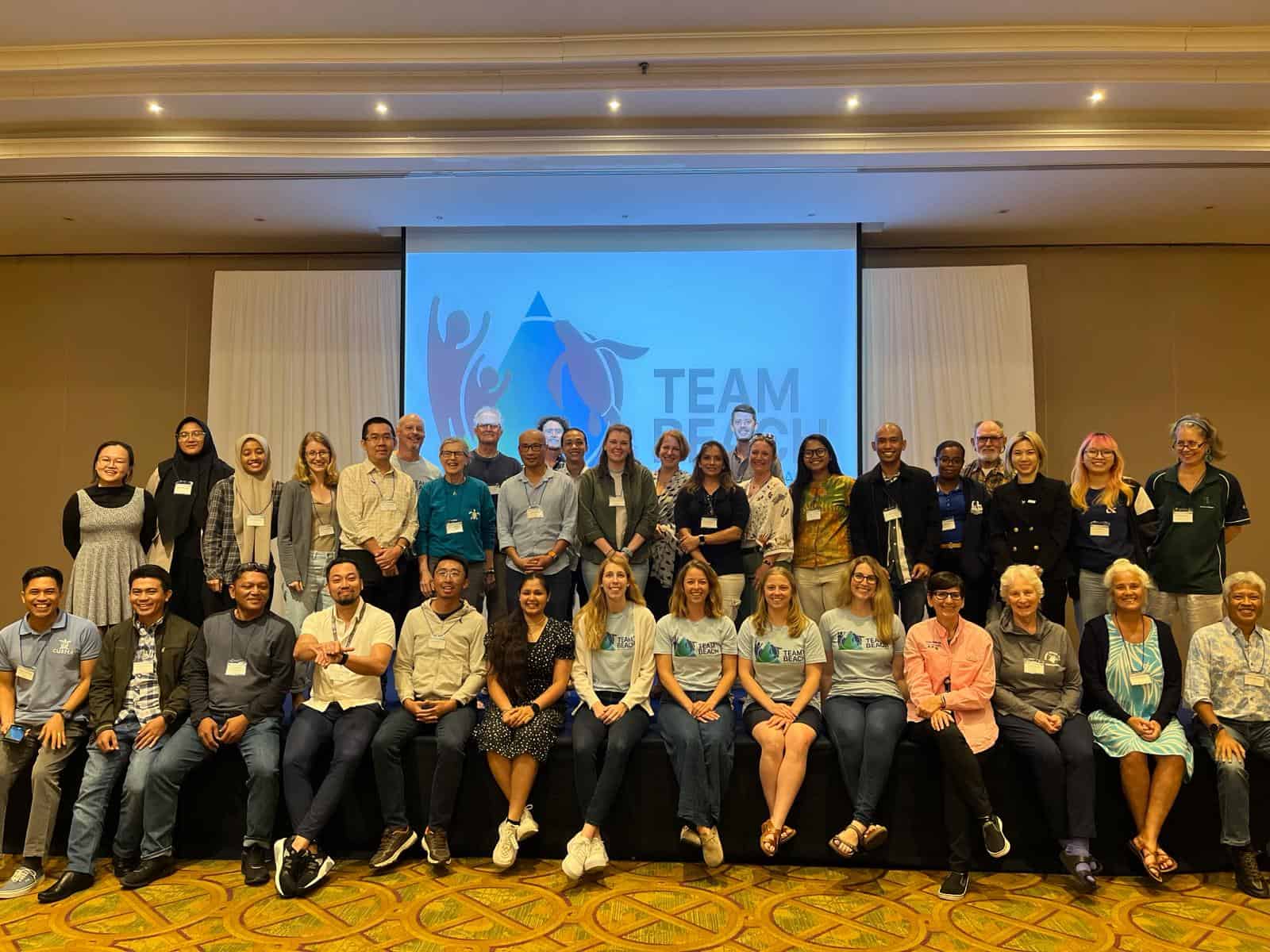[ad_1]
Members of the Oceanic Society group just lately traveled to Pattaya, Thailand to steer a conduct change coaching workshop for sea turtle conservation professionals who have been gathered from all over the world to take part within the forty second Worldwide Sea Turtle Symposium.
The workshop, titled “Creating Conduct Change Methods for Sea Turtle Conservation,” was organized and led by Staff BEACH, a partnership between Oceanic Society, Human Nature Group, and Disney Conservation. With assist from the U.S. Fish and Wildlife Service and the Affiliation of Zoos and Aquariums’ Sea Turtle SAFE program, we convened greater than 40 individuals from greater than a dozen nations to take part. It was the second such workshop led by Staff BEACH; the primary was held in Cartagena, Colombia in March 2023.
The objective of the workshop was to introduce conduct change idea and social science to sea turtle conservation practitioners, in addition to to place these rules and methods into observe with real-world examples. Whereas many sea turtle conservation organizations implement outreach packages of their communities, not all of them are designed with tangible conduct change objectives and analysis plans. By way of this coaching workshop, Staff BEACH goals to assist conservation practitioners to enhance their packages’ impacts.


Designing Conduct Change Campaigns: Workshop & Coaching
For this workshop, Staff BEACH solicited and chosen case research from our international community of practitioners — actual world examples of sea turtle conservation challenges that require conduct change options — with an emphasis on packages addressing problems with sea turtle take and commerce in Southeast Asia. 4 case research have been chosen, and people have been offered on the workshop for dialogue. As well as, members of Staff BEACH offered an summary of conduct change idea, in addition to Staff BEACH’s framework for designing and evaluating conduct change campaigns.
The next case research have been offered and mentioned on the workshop:
Group: Fauna & Flora MyanmarLocation: Ayeyarwaddy, Tanintharyi, and Rakhine area, MyanmarChallenge: BycatchFocus: Working with fishermen to alter fishing practices, selling protected dealing with of turtles, and decreasing environmental air pollution.
Group: Anambas FoundationLocation: Teluk Dalam Island, Sunggak Village, Anambas Islands IndonesiaChallenge: Unlawful harvesting of turtles and eggsFocus: Lowering unlawful egg harvesting and selling turtle safety amongst fishers in Sunggak Village.
Group: Lestari NGO, Zoo Liberec, and Andalas UniversityLocation: Pulau Banyak and Nias, Sumatra, IndonesiaChallenge: Unlawful harvest and trafficking of sea turtlesFocus: Strengthening native surveillance at sea, collaboration with regulation enforcement, and focusing on Nias fishers to cut back turtle harvests.
Group: CURMALocation: La Union, PhilippinesChallenge: Managing tourism influxFocus: Creating protecting insurance policies and consciousness campaigns to advertise accountable tourism and defend sea turtles from disturbances.
The workshop kicked off with an introductory dialogue of assorted behavioral science theories, specializing in understanding audiences and the catalysts of human conduct—integral parts for designing profitable campaigns and tasks. Contributors discovered about finest practices, widespread pitfalls, and hurdles encountered when using behavioral science, in addition to the best approaches for particular eventualities.
From there, contributors divided into 4 teams, every assigned to a case research, to brainstorm efficient conduct change options for the respective challenges. Guided by a specialised conduct change motion plan and toolkit, this train aimed to deconstruct the weather of every case research for a extra nuanced understanding and focused behavioral interventions.
Contributors have been then tasked with presenting their options to the broader group, fostering open dialogues about every proposed resolution with fellow workshop contributors. By the workshop’s conclusion, attendees had gleaned insights from conduct change specialists and efficiently utilized these insights to real-life eventualities confronted by sea turtle conservation professionals.
Journey Grants Sponsor Workshop Participation
Because of assist from U.S. Fish and Wildlife Service, Oceanic Society was in a position to fund the participation of 14 sea turtle conservation practitioners from all through the Southeast Asia area, together with Cambodia, Indonesia, Myanmar, Philippines, Thailand, and Vietnam. Not solely have been the journey grant recipients in a position to attend the Staff BEACH workshop, but additionally all the forty second Worldwide Sea Turtle Symposium in Pattaya, Thailand, at which that they had the chance to be taught and alternate with greater than 500 members of the worldwide analysis and conservation group.
Subsequent Steps
Following the workshop, the Staff BEACH coordinators will evaluate and refine the suggestions and draft plans that have been developed for every case research, and can in the end present a conduct change technique again to every collaborating group. Case research will even be shared on-line and among the many Staff BEACH community—for examples of what this may seem like, discover the case research and techniques from final yr’s workshop.
About Staff BEACH
Staff BEACH (BE A CHangemaker) is a world community that goals to strengthen and measure the impression of sea turtle training and outreach tasks worldwide. It’s a platform to assist information and useful resource sharing amongst conservationists and social scientists in search of to advertise outreach methods that lead to significant conduct change. Launched by the State of the World’s Sea Turtles Program / Oceanic Society and Disney Conservation, Staff BEACH is now a rising community of dozens within the sea turtle group managed by Roderic Mast, Brian Hutchinson, Ashleigh Bandimere, Lindsay Mosher (Oceanic Society/SWOT), and Rachel Smith, and Kelley Anderson (Human Nature Group).
Study extra about Staff BEACH in our latest publication: How Behavioral Science (and Staff BEACH) Can Assist Sea Turtles
[ad_2]
Source link


